The Levant Basin, which sits in the Mediterranean, is estimated to have some 1.7 billion barrels of oil, while over 1.5 billion barrels are estimated to lie beneath the occupied West Bank area.
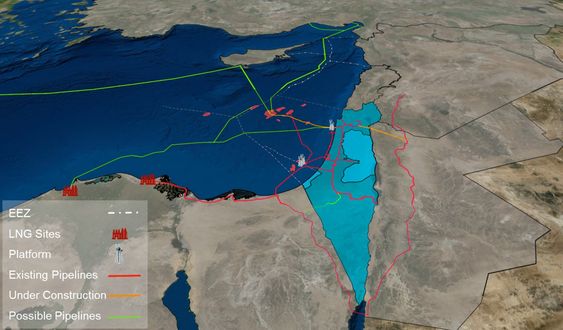
The unrealized potential of Palestinian oil and gas reserves
Oil and natural gas resources in the occupied Palestinian territory could generate hundreds of billions of dollars for development both outside Gaza and in the Westbank. So far, Israel, Egypt, and Jordan are the ones benefitting from it besides the usual suspects: the big international oil and gas companies.
Leviathan, with 22.9 TCF of recoverable gas, is the largest natural gas reservoir in the Mediterranean and one of the largest producing assets in the region.
The reservoir was discovered in December 2010 by NEWMED Energy (with a working interest of 45.3%), Chevron (which was called “Noble Energy” at the time, with a working interest of 39.7%), and Ratio (with a working interest of 15%).
In February 2017, after an intensive evaluation of the 330 sqkm field, the Leviathan partners made a final investment decision to execute Phase 1A of the field’s development plan, with an annual production capacity of 12 BCM. Production of natural gas from Leviathan began on December 31, 2019, on time and on budget, and has since become a cornerstone of gas supply in Israel, Egypt, and Jordan.
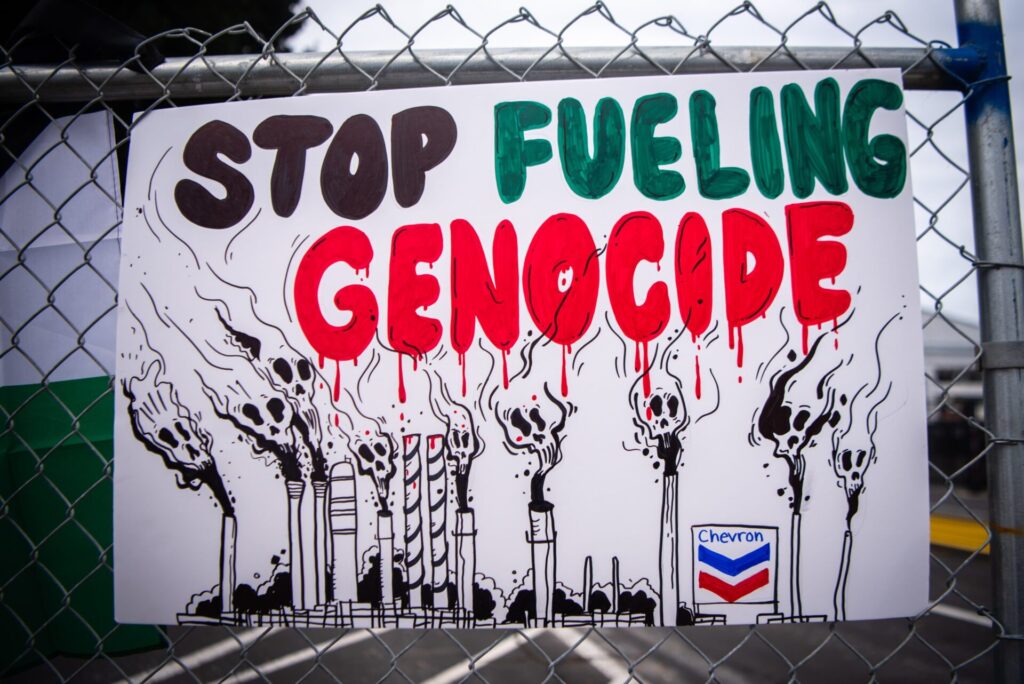
BBBBB
Jared Kushner salivates at Gaza’s waterfront property, then urges Israel to “finish the job.” @MikoPeled, an Israeli general’s son turned Palestine activist says this chilling rhetoric echoes Hitler’s “final solution.”pic.twitter.com/830bvfMITg
— BreakThrough News (@BTnewsroom) March 26, 2024
IDF released images of the construction of the US-British-Israeli pier in Gaza.
Food trucks are currently denied access to Gaza, this pier has nothing to do with aid.
But with military presence, boots on the ground in Gaza and of course the gas fields off the coast of Gaza. pic.twitter.com/yEnff4vgfQ — The Uncrowned Queen (@FrancineKetelaa) March 23, 2024
United States said to be building a port in Gaza to supply food aid and they are using the rubble from the destroyed civilian home.
WHILE the food aid is waiting to be entered into Gaza from Egypt.
“Trust me; if America is building port in Gaza, they are coming to extract gas.” pic.twitter.com/F0RngDdl9U
— William B. (@The_NightReport) March 21, 2024
The EU just paid Egypt €7.4b
The IMF gave Egypt $8b earlier this month
The UAE promised to invest €32b last monthWhy would these specific actors give Egypt all this money?
Buying Sisi’s cooperation before the invasion of Rafah, or while they take Gaza’s gas?
— Richard Medhurst (@richimedhurst) March 18, 2024
Afni Regita Cahyani Muis, Universitas Darussalam Gontor
The January attack by Iranian-backed Yemeni Houthi on commercial ships crossing the Red Sea shows how economic and geopolitical forces intersect in Israeli and Palestinian conflict. The group is part of Iran’s alliance of anti-Israel and anti-Western alliance regional militias. Supposedly aimed at harming Israel’s allies’ economy, the attack has caused disruptions to international maritime transport.
As a result, some major logistics, as well as oil and gas companies, paused their shipping, resulting in rising prices worldwide. The US and UK – often seen as Israel’s allies – responded to the attack with multiple military strikes.
Geoeconomic ambitions in the Israeli-Palestinian conflicts
Israel seeks to cooperate with Egypt and Saudi Arabia as it shares geoeconomic interests in developing an integrated economic zone in the Suez Canal and optimising the economic potential of the Red Sea region.
Suez Canal is an artificial sea-level waterway in Egypt, connecting the Mediterranean Sea to the Red Sea
The development of the Suez Canal went on for decades through the construction of the integrated Sinai project area that began from 1982 to 2014.
An agreement consented by Cairo and Riyadh in 2016 reassigned ownership of two Red Sea islands to Saudi Arabia. This agreement opens up long-term investment opportunities for the Gulf countries for its potential to become an integrated economic zone.
The ambition to develop the Middle East’s economy does not go unnoticed by Israel as the country engages in regional development cooperation despite its long history of conflicts with Arab states.
Israel engaged in a war with the coalition of Arab states – particularly Egypt, Syria and Jordan – in 1967. The six-day war – an escalated tension over territorial disputes in the region – led to over 300,000 Palestinians being displaced from the West Bank.
Despite the conflicts, the countries in the region have been pushing to restore security by constructing a maritime route as a major economic integration area.
When the Suez Canal was closed for eight years as a result of the Israel-Arab war, it cost the world US$1.7 billion in lost trade.
Israeli economic interests in Palestinian soil
The Eastern Mediterranean region – which includes Egypt, Lebanon, Turkey, Israel, Palestine, Cyprus, and Greece – is a region rich in gas resources.
Egypt’s ambition to connect the Red Sea and the Mediterranean Sea through the Suez Canal is an opportunity for Israel to develop Leviathan, an offshore gas field in the Levantine Basin, part of the Eastern Mediterranean.
Located at the sea border between Israel, Lebanon, the Gaza Strip and Cyprus, the Leviathan is a giant natural gas field discovered in 2010 with a potential production of millions of barrels of oil.
Israel’s interest in developing its energy sector raises speculations that its bombing campaign in Gaza is not only to fight Hamas and prevent further deadly attacks such as Oct. 7 but also to take control of the Gaza Strip, a strategic location that is directly connected to the Mediterranean sea.
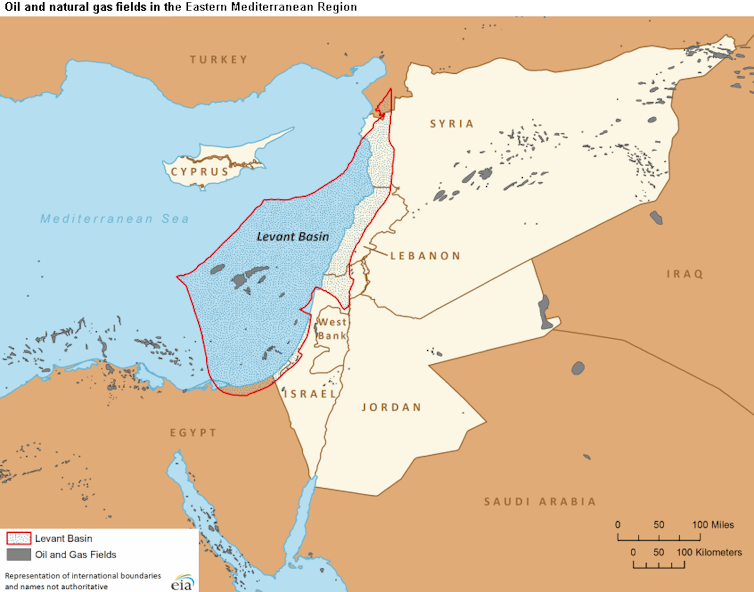
Middle Eastern responses
The escalation of violence in the Israeli-Palestinian conflict adds tensions in the region.
Due to geopolitical instability, the ongoing conflict in Palestine has affected the supply of Middle Eastern oil and gas resources as the world’s leading energy exporter.
Countries such as Lebanon, Iraq, Syria and Yemen support Palestine. Like the preceding conflicts, Egypt still focus on promoting diplomacy, settling border disputes and distributing aid.
Meanwhile, Saudi Arabia has said it will recognise Israel as a sovereign state only if the conflict is over and Palestine is recognised as a state.
Experts gathered at last year’s Doha Forum in Qatar say that the Middle East countries are reluctant to normalise relations with Israel and recognise it as a sovereign state.
This is because the current conflict has created a multipolar world, referring to the condition of the numerous poles of power influencing the international political order.
The alleged genocide committed by Israel against Palestinian civilians has also shifted how the world’s view of Israel.
Despite US support for Israel, demonstrated by the use of its veto in the UN Security Council to reject the call for a ceasefire, most of the EU countries, which are important trading partners with Israel, support a ceasefire.
Protests against Israel by the international community have been linked to various transnational movements, including boycotting of pro-Israeli products, causing losses to several multinational companies in multiple countries.
The ongoing conflict affects not only Middle Eastern countries but also the US.
The US taking Israel’s side opens up a huge opportunity for China and Russia to expand their political-economic influence in the Middle East – increasingly expanding the poles of interest in the region – such as Saudi Arabia, Egypt, Iran and the United Arab Emirates.
Those countries are beginning to lean to the BRICS, an intergovernmental organisation comprising the world’s most important developing countries founded in 2006 with Brazil, Russia, India and China its initial members.
With rivalries between China, Russia and the US, this will be a burden of economic interests that potentially undermine the US’ influence as Israel’s main ally.![]()
Afni Regita Cahyani Muis, Dosen Prodi Hubungan Internasional, Universitas Darussalam Gontor
This article is republished from The Conversation under a Creative Commons license. Read the original article.

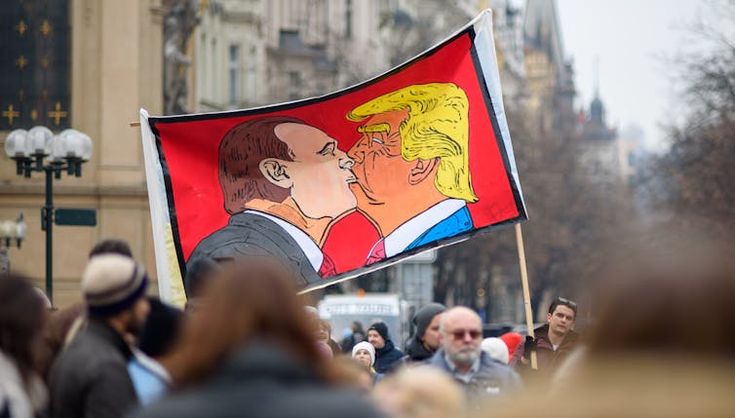
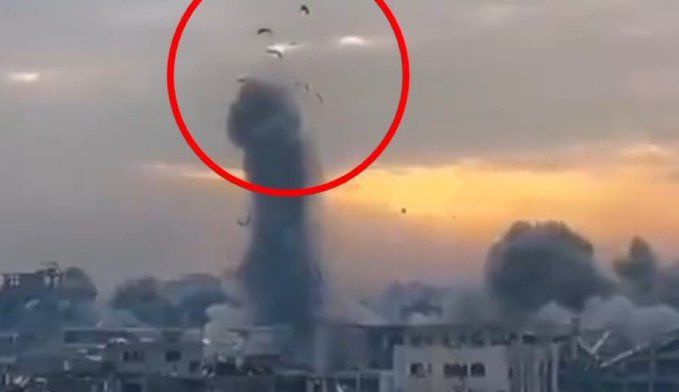

1 Comment
Pingback: Netanyahu first foreign leader to meet Trump as the USA Sanctions the International Criminal Court in betrayal of the International Justice System - Bergensia